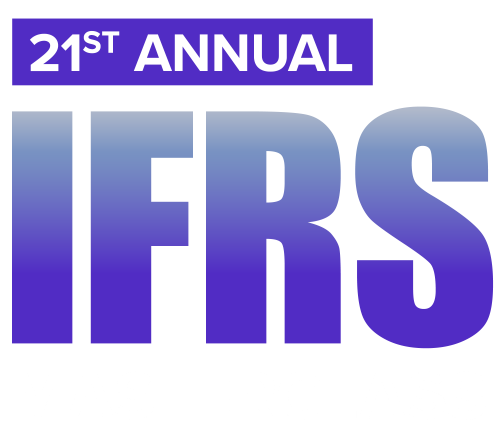21st annual ifrs masterclass
IFRS MasterClass 2026

26 February 2026 | VIRTUAL EVENT
Master the complexities of global financial reporting standards
The online conference is designed to empower finance professionals with the knowledge and tools necessary to navigate IFRS challenges in financial reporting, ensuring compliance and transparency in reporting practices.
Please note: This conference is a virtual event.

What you will gain
This unique platform offers a comprehensive learning experience that will empower you to make informed decisions and achieve compliance with confidence.
- Stay ahead of the curve: Get the latest developments within IFRS regulations.
- Real-world application: Hear expert observations on how IFRS standards are impacting the New Zealand economy.
- Actionable insights: Gain practical knowledge from in-depth case studies.

Key themes
1
IFRS Updates & Global Impact
Stay informed on IFRS changes and their global influence.
2
Communication Strategies
Learn to effectively communicate financial information to non-financial audiences
3
Financial
Innovation
Explore the impact of AI and embedded finance on business models.
4
Emerging
Issues
Understand and address rising topics like climate disclosures and AI ethics in finance.
5
Financial Reporting Compliance
Master compliance with comprehensive strategies and avoid potential consequences.
6
NZ Economic & Regulatory Environment
Plan for NZ’s economic future and navigate its evolving financial regulations.
Agenda
8:45 | Virtual platform opens |
9:00 | Welcoming remarks from the Chair Richard Smyth, Chief Financial Officer & Company Secretary, Steel & Tube |
9:10 | The future of IFRS Standards: navigating global consistency in an uncertain world
Dr Alan Teixeira, Global Director of IFRS Research, Deloitte |
9:50 | Global consistency vs. local flexibility in IFRS Standards adoption
David Pacey, Partner, Grant Thornton |
10:30 | Morning break |
11:00 | IFRS 18 - Transition of Financial Reporting
Rosalea Paterson, Partner , Deloitte Matthew Strickett, Director, Audit & Assurance, Deloitte |
11:40 | Case study: IFRS 17 insurance contracts - lessons from implementation
Brendan Counsell, Partner, Financial Services, EY |
12:20 | Lunch |
13:20 | Integrating sustainability into corporate reporting and building trust in sustainability disclosures
Dr Caroline Bridges, Consultant, Caroline Bridges Consulting |
14:00 | Case Study: Technology and data challenges in sustainability reporting
Pip Best, Partner, Climate Change and Sustainability Services Leader, EY |
14:40 | Digital Innovation: AI, finance transformation, and the future of IFRS Standards reporting
Ivan Wells, Manager Financial Control, Suncorp New Zealand |
15:20 | Afternoon break |
15:40 | Effective communication strategies to engage with non-financial stakeholders
Jay Patel, Head of Finance , Fidelity Life Assurance |
16:20 | Summary remarks from the Chair & end of conference Richard Smyth, Chief Financial Officer & Company Secretary, Steel & Tube |
Speakers
More Info
Lorem ipsum dolor sit amet, consectetur adipiscing elit, sed do eiusmod tempor incididunt ut labore et dolore magna aliqua. Ut enim ad minim veniam, quis nostrud exercitation ullamco laboris nisi ut aliquip ex ea commodo consequat. Duis aute irure dolor in reprehenderit in voluptate velit esse cillum dolore eu fugiat nulla pariatur. Excepteur sint occaecat cupidatat non proident, sunt in culpa qui officia deserunt mollit anim id est laborum.
More Info
Lorem ipsum dolor sit amet, consectetur adipiscing elit, sed do eiusmod tempor incididunt ut labore et dolore magna aliqua. Ut enim ad minim veniam, quis nostrud exercitation ullamco laboris nisi ut aliquip ex ea commodo consequat. Duis aute irure dolor in reprehenderit in voluptate velit esse cillum dolore eu fugiat nulla pariatur. Excepteur sint occaecat cupidatat non proident, sunt in culpa qui officia deserunt mollit anim id est laborum.
More Info
Lorem ipsum dolor sit amet, consectetur adipiscing elit, sed do eiusmod tempor incididunt ut labore et dolore magna aliqua. Ut enim ad minim veniam, quis nostrud exercitation ullamco laboris nisi ut aliquip ex ea commodo consequat. Duis aute irure dolor in reprehenderit in voluptate velit esse cillum dolore eu fugiat nulla pariatur. Excepteur sint occaecat cupidatat non proident, sunt in culpa qui officia deserunt mollit anim id est laborum.

Richard Smyth
Read bio

Dr Alan Teixeira
Read bio

Jay Patel
Read bio
Jay Patel is a senior finance leader with broad experience in reporting, taxation, leadership, and transformation across roles in New Zealand and the UK. He heads the Finance team at Fidelity Life, leading 15 staff across four functions. A champion of agile thinking, Jay has driven major improvements, including reducing monthly reporting from 15+ to 4 days. His team was named Fidelity Life’s Team of the Year and was a finalist at the 2020 NZ CFO Awards.

Dr Caroline Bridges
Read bio

David Pacey
Read bio

Pip Best
Read bio

Brendan Counsell
Read bio

David Phillips
Read bio

Matthew Strickett
Read bio

Ivan Wells
Read bio
Sponsors
Sponsors to be announced
Don't miss out on the connections and credibility boost!
Live B2B events are your chance to shine. Showcase your thought leadership, solidify your market position, and forge valuable connections with potential customers – all at once.
This exclusive event puts you in front of a highly skilled audience hungry for insights. Get ready for meaningful engagement that drives results.
Plus, we have some unique opportunities to put your company, products, and services in the spotlight.
Ready to take your brand to the next level? Contact us today to learn more or secure your spot at this leading event.

Want to join this virtual conference?
Multi Buy 3+ tickets
-
Must be from same organisation and book at the same time. For valid tickets, payment by 26 February, 2026.
Individual Tickets
Registration Conditions
Ticket Terms
All prices are in New Zealand dollars ($NZD)
A surcharge of 2.5% + GST applies to credit card payments on top of the total amount.
Pre-Sale Tickets are valid only for the specific event for which they were purchased and cannot be transferred to other events. To remain valid, Super Saver and Early Bird tickets must be paid by date quoted.
Group ticket options are valid for registrations from the same organisation, booked at the same time.
By selecting any special pricing offer for classes of organisation, sector, or individuals or using any promotion code, you are asserting to the organiser your right to claim any such pricing offer, and acknowledge the organiser’s right to audit such claim and, if in the opinion of the organiser using its sole discretion the conditions for special pricing are not met, reject any registration.
For full terms & conditions, please visit https://www.brightstar.co.nz/terms-and-conditions
Get in touch.
Got questions? Write to us.

